Aschbach, Bas-Rhin
Aschbach is a commune in the Bas-Rhin department in the Grand Est region of north-eastern France.
Aschbach
Àschbàch | |
|---|---|
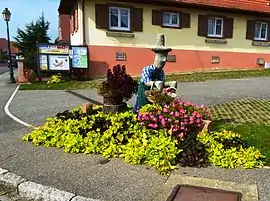 Street Art in Aschbach | |
.svg.png.webp) Coat of arms | |
Location of Aschbach 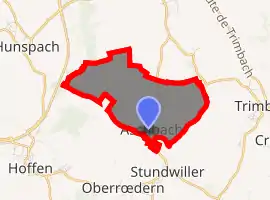
| |
 Aschbach 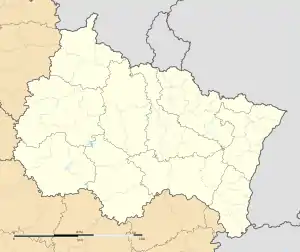 Aschbach | |
| Coordinates: 48°56′07″N 7°59′03″E | |
| Country | France |
| Region | Grand Est |
| Department | Bas-Rhin |
| Arrondissement | Haguenau-Wissembourg |
| Canton | Wissembourg |
| Intercommunality | CC Outre-Forêt |
| Government | |
| • Mayor (2014-2020) | Paul Heintz |
| Area 1 | 4.32 km2 (1.67 sq mi) |
| Population (2017-01-01)[1] | 682 |
| • Density | 160/km2 (410/sq mi) |
| Time zone | UTC+01:00 (CET) |
| • Summer (DST) | UTC+02:00 (CEST) |
| INSEE/Postal code | 67012 /67250 |
| Elevation | 137–178 m (449–584 ft) |
| 1 French Land Register data, which excludes lakes, ponds, glaciers > 1 km2 (0.386 sq mi or 247 acres) and river estuaries. | |
The inhabitants of the commune are known as Aschbachois or Aschbachoises.[2]
Geography
Aschbach is located some 13 km south by south-east of Wissembourg and 8 km east of Soultz-sous-Forêts. Access to the commune is by the D245 road from Stundwiller in the south passing through the village and continuing north to Seebach. With exception of a small band of forest on the western border the commune is entirely farmland.[3]
The Seebach river forms the eastern border of the commune as it flows south to join the Seltzbach at Buhl. An unnamed stream rises in the centre of the commune and flows south-east through the village to join the Seebach on the south-eastern border.[3]
History
In the 14th century Aschbach was the property of the Diocese of Speyer (Germany). Under the Ancien Régime Aschbach, Stundwiller, and Oberroedern formed the Superior Court with their church at Stundwiller. These three villages were merged in 1974 but Aschbach was separated again in 1988.
According to the cadastral plan of 1839 there were buildings built close together and also other places which were marshlands. The school was built in 1833, an oratory at a place called Kreutzfeld dates to 1864, and the church was built in 1871.
The village suffered terrible damage in the Second World War and reconstruction gave the village a new look with a larger and more open built-up area. The presbytery was built in 1950.[4]
Heraldry
.svg.png.webp) Arms of Aschbach |
Blazon: Sable, three bends wavy of Or. |
Administration
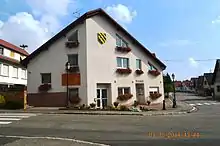
List of Successive Mayors[5]
| From | To | Name | Party | Position |
|---|---|---|---|---|
| 2001 | 2014 | Gérard Strasser | ||
| 2014 | 2020 | Paul Heintz |
(Not all data is known)
Demography
In 2017 the commune had 682 inhabitants.
|
| ||||||||||||||||||||||||||||||||||||||||||||||||||||||||||||||||||||||||||||||||||||||||||||||||||||||||||||||||||
| Source: EHESS[6] and INSEE[7] | |||||||||||||||||||||||||||||||||||||||||||||||||||||||||||||||||||||||||||||||||||||||||||||||||||||||||||||||||||
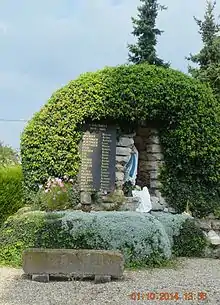
Sites and monuments
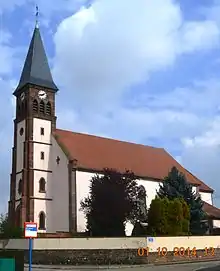
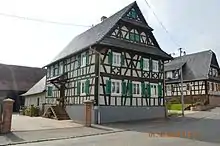
Aschbach has four registrations as historical monuments. These are:
- Parish Church of the Immaculate Conception (1871, 1908, 1928)
 [8]
[8] - Farmhouse at 19 Grand Rue (18th-20th century)
 [9]
[9] - House and Farms (18th and 19th century)
 [10]
[10] - The Village (14th century)
 [4]
[4]
The Church of the Immaculate Conception has many items which are registered as historical objects. These are:
- 2 Monstrances (around 1871)
 [11]
[11] - Monstrance (around 1871)
 [12]
[12] - Cross: Christ on the cross (around 1871)
 [13]
[13] - Painting: Saint Joseph with the child Jesus (around 1871)
 [14]
[14] - 10 Statues of Saints (around 1871)
 [15]
[15] - Pulpit, 2 Confessionals, Baptismal fonts (around 1871)
 [16]
[16] - 3 Altars, 3 Tabernacles, 3 Retables, church stall, half-height panelling (main altar, altar tombstone, secondary altar) (around 1871)
 [17]
[17] - Furniture in the Church
 [18]
[18] - Wayside cross: Christ on the cross at Hohlacker (1809)
 [19]
[19]
Aschbach Picture Gallery
 The entry to Aschbach
The entry to Aschbach An old house in Aschbach
An old house in Aschbach A street in Aschbach
A street in Aschbach The Wayside Cross
The Wayside Cross
- Inside the Church
 Church Interior
Church Interior The Main Altar
The Main Altar The Secondary Altar
The Secondary Altar The Pulpit
The Pulpit Painting of Saint Joseph with the child Jesus
Painting of Saint Joseph with the child Jesus
See also
References
- "Populations légales 2017". INSEE. Retrieved 6 January 2020.
- Inhabitants of Bas-Rhin (in French)
- Google Maps
- Ministry of Culture, Mérimée IA00118787 Village (in French)
- List of Mayors of France (in French)
- Des villages de Cassini aux communes d'aujourd'hui: Commune data sheet Aschbach, EHESS. (in French)
- Population en historique depuis 1968, INSEE
- Ministry of Culture, Mérimée IA00118789 Church of the Immaculate Conception (in French)
- Ministry of Culture, Mérimée IA00118790 Farmhouse (in French)
- Ministry of Culture, Mérimée IA00118788 Houses and Farms (in French)
- Ministry of Culture, Palissy IM67005080 2 Monstrances (in French)
- Ministry of Culture, Palissy IM67005079 Monstrance (in French)
- Ministry of Culture, Palissy IM67005078 Cross: Christ on the Cross (in French)
- Ministry of Culture, Palissy IM67005077 Painting: Saint Joseph with the child Jesus (in French)
- Ministry of Culture, Palissy IM67005076 10 Statues (in French)
- Ministry of Culture, Palissy IM67005075 Pulpit, 2 Confessionals, Baptismal fonts (in French)
- Ministry of Culture, Palissy IM67005074 3 Altars, 3 Tabernacles, 3 Retables, stall, panelling (in French)
- Ministry of Culture, Palissy IM67005073 Furniture (in French)
- Ministry of Culture, Palissy IM67005081 Wayside Cross (in French)
External links
- Aschbach, Bas-Rhin on Lion1906
- Aschbach on the National Geographical Institute website (in French)
- Aschbach on Géoportail, National Geographic Institute (IGN) website (in French)
- Asbach on the 1750 Cassini Map
| Wikimedia Commons has media related to Aschbach. |